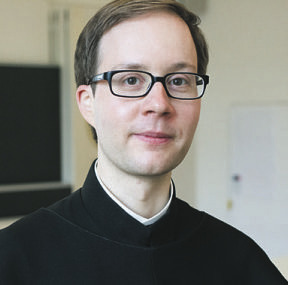SIDE VIEW: BELIEVE AND DOUBT
PATER THOMAS FÄSSLER
I don’t remember exactly how we actually came to the conclusion in history class at our collegiate school that there is much more than we can perceive with our human senses. In the reverberant “Hallelujah” of Easter with all its questions, whether God really exists, whether there is life after death and if so, what this looks like, I want to try to reconstruct the way there.
How should there be?
It began with fasting and went on to holy brother Klaus, who – as one pupil knew – of course did not completely renounce food, but lived only on the Eucharist for twenty years. When we then came to the Catholic understanding of the Eucharist with the belief in the – with our senses imperceptible – change of bread and wine in the body and blood of Christ and I looked at interested faces, I said to the class: «So, let’s leave briefly history lesson and let’s take a leap into the sphere of faith! ” I opened my little digression with the fact that today, for many people, only what is recognized as real is what we can smell, touch, taste, hear and, above all, see. We banish everything else to the realm of fairy tales and fantasy. We can, but we have to critically investigate by asking ourselves how the people around us would have reacted a few hundred years ago if we had told them about ultraviolet light or radioactive radiation. Head shaking and words like “weirdo” would have been the reactions to it. We couldn’t have blamed them. After all, we cannot perceive both – how should they exist then?
However, other living beings can perceive these realities: birds and fish, for example, are able to recognize light in the UV range. Most insects are also attracted to UV stains on flowers that the human eye is unable to see. We would know in a hiss that there is so much in the world … Some of what we cannot recognize with our senses, we have now made perceptible for us with technical aids. For example, we can now also see UV light. And since the beginning of the last century, thanks to the electron microscope, we have also been able to detect viruses whose existence had previously only been postulated on the basis of their effects after an attack on an organism.
So by now we would know that there are some things in the world that actually exist without our being able to perceive them with our five senses. Consequently, this leads to the question of whether there is perhaps more that exists just as real, but for which we have simply not yet developed any tools for recognizing. Can we perhaps explain in the future why we immediately find some people sympathetic, but hardly others? Can we ever bring love at first sight to paper, in black and white, without having to rely on a vague gut feeling that is so difficult to put into words, let alone can be objectively proven?
In the head, such “arguments” seem to be logical. And yet many often find it difficult to imagine that something else should happen when the body of a deceased is laid in the ground, because we only see that it is decaying. Not more.
“So, let’s get back to the actual topic,” I said finally, to resume history class. However, there is only a separation between these two topics in the classroom. She certainly doesn’t know life.
«We cannot perceive it.
How should they exist then? “
Father Thomas Fässler
(* 1984) has been a monk at Einsiedeln Abbey since 2006. He studied theology, history and Latin and teaches at the monastic collegiate school, where he also works as a school chaplain and acolyte carer.
–

